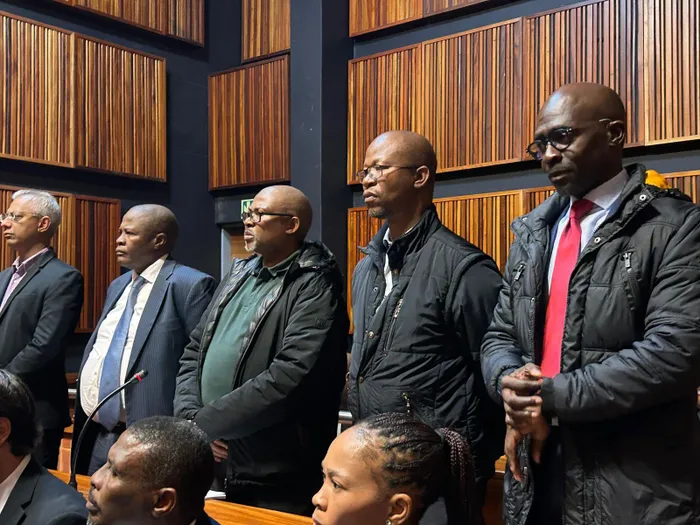Fikile Mbalula confirms Malusi Gigaba's step aside from ANC activities amid corruption charges

Former public enterprises minister Dr Malusi Gigaba (red tie) will step aside from his ANC duties after being charged with corruption linked to multimillion-rand Transnet locomotive contracts.
Image: IDAC
ANC secretary-general Fikile Mbalula has confirmed that ANC NEC member and former public enterprises minister Dr Malusi Gigaba has been charged with corruption, and that he will step aside from party activities.
Mbalula was speaking during a post-NEC media briefing on Tuesday afternoon, outlining key decisions and organisational directives arising from the weekend NEC meeting held in Ekurhuleni.
The briefing took place at the ANC’s headquarters, Chief Albert Luthuli House in Johannesburg, at 1pm.
“The Malusi case has been dealt with. We got a report towards this media briefing,” Mbalula said.
“From the ANC’s side, Malusi has been charged with corruption. He will have to step aside. He will do that voluntarily. And there will be a statement to that effect, even now when I finish this media briefing.”
He was responding to a question on whether Gigaba would be required to step aside under the ANC’s step-aside rule, which applies to all members who have been criminally charged or who have appeared in court.
Mbalula said he was yet to receive a report from Gibaba about the corruption allegations against him. Then the party will issue a media statement afterwards.
The ANC says the step-aside rule is intended to protect the party’s image and requires members facing criminal charges to voluntarily step back from their party, and government activities.
Those previously affected include former secretary-general Ace Magashule, charged with corruption and fraud linked to the multimillion-rand asbestos tender, and Zizi Kodwa, who stepped aside last year after being charged with state capture-related corruption.
Earlier, IOL News reported that Gigaba, who also serves as co-chair of Parliament’s Joint Standing Committee on Defence, appeared in the Palm Ridge Magistrates’ Court on Tuesday, facing a corruption charge.
Gigaba, an ANC Member of Parliament, faces charges related to three Transnet contracts he signed during his tenure as public enterprises minister.
Authorities are probing wide-scale corruption linked to Transnet SOC Ltd’s multibillion-rand locomotive procurement programme.
Earlier this month, IOL News reported that Gigaba visited the offices of the Investigating Directorate Against Corruption (IDAC) in Lynnwood, Pretoria East.
At the time, IDAC confirmed he had not been arrested and would not be appearing in court that day.
The visit formed part of the National Prosecuting Authority’s efforts to investigate individuals implicated in large-scale state capture-era corruption involving state-owned entities.
The investigation centres on irregular procurement contracts awarded between 2010 and 2014, including a controversial locomotive deal valued at approximately R54 billion.
Following Gigaba’s court appearance on Tuesday, IDAC spokesperson Henry Mamothame told reporters that Gigaba faces a charge of corruption alongside four former Transnet executives: Brian Molefe, Siyabonga Gama, Anoj Singh, and Thamsanqa Jiyane.
In June, IOL News reported that the four were released on R50,000 bail each after being charged with corruption linked to the Gupta family.
“Dr Gigaba’s court appearance relates to the period between November 2010 and May 2014, when the alleged offences were committed during his tenure as Minister of Public Enterprises,” Mamothame said.
He added that the tender processes for acquiring locomotives were “flouted”, with three contracts for 95, 100 and 1,064 locomotives irregularly awarded, resulting in billions of rands in losses for Transnet.
“The State alleges that during this period Dr Gigaba, on various occasions, accepted and received undisclosed amounts of cash from members of the Gupta family, which were corrupt in nature and to which he was not entitled,” Mamothame said.
All accused were presented with an updated charge sheet.
The matter has been postponed to January 30, 2026 for disclosure of the docket, provision of an indictment, and the setting of a date for the case’s transfer to the High Court.
IOL